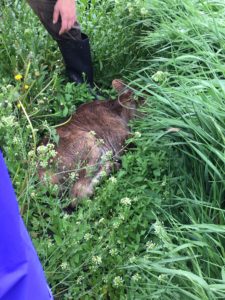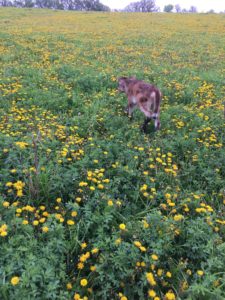The day of May 17th started out like normal with breakfast at Mr. Stole’s house. However, plans had to be flexible due to the rain. It’s crazy to think that just the day before the weather was over 80 degrees and hot and today it’s rainy and chilly. It seems that Iowa weather is just as variable as the soil.
At 9:30 we arrived at POET, an ethanol plant located in Jewell, Iowa, to meet with Jerry Rabe. The POET company is a large-diversed company, but biofuels constitutes the largest part of its portfolio. At the Jewell plant, corn is turned into ethanol. The leftover corn solids (whole stillage) is rich in protein and therefore is converted into DDGs used for animal feed. Professor Kevin Butt, on Thursday, mentioned that the BioTech program at Ellsworth Community College had been discontinued due to low enrollment and the limited market for this degree. Mr. Rabe seemed to echo these comments; the turnover rate for employees monitoring the plant operations (who presumably would have been trained to do this at Ellsworth) is quite low, so there are few openings. The employment need at Poet is centered on maintenance personnel, who are in high demand, and where high turnover is experienced. Moreover, Rabe says a lot of the work at Poet is on-the-job training, which was echoed by two of the operators who we met.
After the Ethanol plant tour, we drove to Lost Lake Farm in Jewell and met Kevin Dietzel. A group of four, myself included, stayed with Kevin to help put up a fence. Mr. Dietzel has dairy cows that are grass-fed, and he employs rotational grazing. This is why we were putting up a fence. The cows are moved to a different pasture twice a day every 12 hours. We covered a lot of ground with Mr. Dietzel, both figuratively and literally. We learned a little about Iowa’s geographic qualities and the plants that covered the grazing fields. Most people think that Iowa is a prairie, but Mr. Deitzel explained that Iowa used to be wetlands and this as contributed to the richness of Iowa’s soil. As of 2015, the Clean Water Act now includes wetlands and seasonal streams as protected waters. Since Iowa used to be wetlands and so far has rained a lot since arriving here, I wonder what the effect of these regulations have upon Iowa farmers. Senator Sweeney has been affected by these regulations as there was a wetland on her land, making it unable to be farmed by government standards.
After completing the fence, we participated in forming a search party for two lost calves. After at least an hour or more of searching we only found one calf. This when I really felt that precision agriculture’s drones would have really come in handy.

We completed the day by meeting Brian Wosepka at “It’s All Good” for pizza. Brian Wosepka only farms 100 acres. Although this sounds like a lot of land, farming 100 acres with conventional farming is not efficient and profitable. Wanting a way into farming, Brian employs some of Joel Salatin’s (featured prominently in Michael Pollan’s Omnivore’s Dilemma and “Food, Inc.”) methods.
